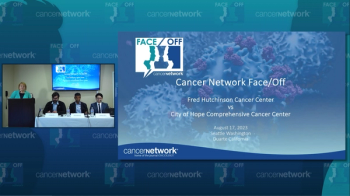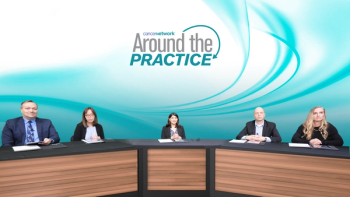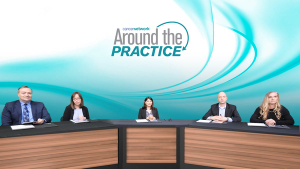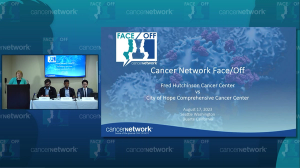
Panelists review the CARTITUDE-4 study results highlighting the efficacy of cilta-cel in lenalidomide-refractory multiple myeloma, addressing implementation challenges and patient preferences in varying relapse scenarios.

Your AI-Trained Oncology Knowledge Connection!


Panelists review the CARTITUDE-4 study results highlighting the efficacy of cilta-cel in lenalidomide-refractory multiple myeloma, addressing implementation challenges and patient preferences in varying relapse scenarios.

Expert insight into the later-line efficacy and tolerability of olverembatinib, a third generation TKI, in ponatinib-resistant, refractory chronic myeloid leukemia populations.

Leading experts discuss the potential benefits and challenges of using ixazomib pomalidomide-dexamethasone as a treatment option for relapsed myeloma patients, considering factors like efficacy, overall survival, and patient demographics.

Considerations for selecting between ponatinib and asciminib as third-line therapies for CML based on factors such as disease burden, mutations, and patient tolerability.

Rahul Banerjee, MD, FACP, discusses the Alliance A061202 trial, presenting the potential benefits and red flags of using ixazomib-pomalidomide-dexamethasone combination in relapsed myeloma treatment.

A review of promising results from the ASCEMBL study, highlighting asciminib's superior efficacy, well-tolerated profile, and potential impact on chronic myeloid leukemia treatment options.

Key insights on real-world applications of the REMIX study, which evaluated real-world effectiveness and tolerability of the ixazomib-based regimen in relapsed/refractory multiple myeloma.

A panel of experts discusses the challenges and considerations surrounding cardiovascular risks associated with ponatinib treatment for chronic myeloid leukemia, emphasizing the need for multidisciplinary collaboration and individualized treatment strategies.

Outcomes of the REMIX study investigating the effectiveness and tolerability of ixa-len-dex in real-world relapsed/refractory myeloma patients, exploring progression-free survival, overall response rate, and safety.

Expert insights into tailoring treatment for biochemical relapse in multiple myeloma patients, considering disease progression and the impact of various therapy lines on treatment decisions.

An insightful discussion among specialists about the challenges of treating biochemical relapse and MRD resurgence in multiple myeloma patients, exploring nuanced considerations, patient collaboration, and the evolving landscape of treatment strategies.

Experts discuss dosing strategies and risk factors for arterial occlusive events in ponatinib treatment for chronic myeloid leukemia, emphasizing the importance of balancing disease control and patient safety.

An expert explores findings of the OPTIC study, revealing optimal dosing strategies for ponatinib in CML treatment, including insights into dose reduction and patient response based on T315I mutation status.

Andrew Cowan, MD, discusses the complexities of relapsed multiple myeloma, distinguishing between biochemical and clinical progression, analyzing survival data, and raising questions about optimal treatment strategies.

An overview of the program agenda and introduction of expert panelists from the Fred Hutchinson Cancer Center and City of Hope teams.

A retrospective analysis of arterial occlusive events in the PACE trial, shedding light on risk factors and management strategies for ponatinib treatment in CML patients.

An overview of the program agenda and introduction of expert panelists from the Fred Hutchinson Cancer Center and City of Hope teams.

Closing out their discussion, the panel highlights unmet needs in multiple myeloma that clinicians and patients still face.

Drs Cowan and Anderson review whether older agents such as isa-based regimens still have a place in R/R MM treatment after the introduction of bispecific agents and CAR-T therapy.

Dr Silbermann continues her discussion of BCMA-targeting agents with a look at data on the use of bispecific agents for R/R MM treatment after a patient has already received a BCMA therapy.

Key opinion leaders compare the overall benefits of CAR-T therapy and share some advice for managing the toxicities of CAR-T therapy as a patient transitions back to their local doctor.

Drs Sidana and Silbermann describe the currently available treatment options for early- and late-relapse MM, and how to select an appropriate regimen.

An explanation of the mechanism of action of bispecific antibodies and their use in relapsed/refractory multiple myeloma treatment.

Dr Caitlin Costello discusses how she adapts treatment to patients with transplant-ineligible NDMM based on fitness level, and why some patients receive doublet therapy.

Experts explain their approaches to maintenance therapy for patients with transplant-ineligible NDMM and when therapy should be reduced.

Dr Larry Anderson summarizes the study design and updated data of the MAIA trial, and Dr Rebecca Silbermann compares it against the SWOG 0777 trial.

Andrew Cowan, MD, presents the results of the ENDURANCE study comparing two triplet regimens in transplant-ineligible MM.

Caitlin Costello, MD, describes how to determine if a patient with MM is transplant-ineligible, and some factors to take into consideration when choosing a treatment regimen.

The panel explains their opinions on induction therapy approaches for high-risk and standard-risk patients with NDMM.

Dr Andrew Cowan describes how the appropriate duration of therapy for patients with transplant-eligible multiple myeloma, and Dr Caitlin Costello discusses her approach to maintenance therapy.

Published: September 22nd 2022 | Updated:

Published: September 26th 2023 | Updated:

Published: September 19th 2023 | Updated:

Published: October 3rd 2023 | Updated:

Published: September 26th 2023 | Updated:

Published: September 12th 2023 | Updated: